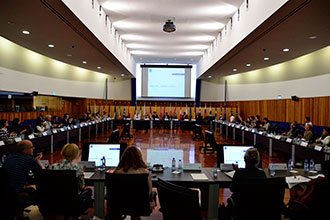Third Contemporary Drug Problems Conference: 'Encountering alcohol and other drugs'
16-18 September 2015, Lisbon, Portugal

Conference theme: Encountering alcohol and other drugs
Over the past twenty years, a conceptual shift has occurred across the social sciences that increasingly focuses attention on issues of relationality, contingency and emergence. ‘Events’, ‘multi-agent systems’, ‘trajectories’, ‘flows’, ‘hybrids’, ‘networks’, ‘phenomena’ and ‘assemblages’ have all emerged as productive, if very different, ways of mapping and understanding the ‘social’. Across such work, we can trace a cumulative inclination to decentre the autonomous human subject, to bring into view the range of complex forces and elements producing scientific and social phenomena, to understand realities as enacted and as inevitably political, and to emphasise the emergent, contingent and multiple co-constitution of objects and subjects.
These new approaches offer much to the study of alcohol and other drug problems. In recent epidemiological research on alcohol and other drugs, specific consumption contexts, situations, occasions and events have become the unit of analysis for a growing strand of research. In recent qualitative social research, attempts to refine and exceed the ‘drug, set and setting’ paradigm first elaborated in 1984 by Norman Zinberg have included ethnographic and sociological studies of drug assemblages, addiction ecologies, drug treatment phenomena and the affective atmospheres of drug use, as well as many different studies on the constitution of problems in alcohol and other drug policy and other areas. Such work hints at a common interest in problematizing longstanding assumptions about the power of pharmacology, the agency of consumers, and the neutrality of settings of consumption, and their status as preceding, rather than emerging within and through, specific drug use encounters.
This conference offers a forum in which the strengths and limitations of these new approaches to alcohol and other drug research can be explored. Building on CDP’s two previous conferences, which variously opened up the question of how ‘drug problems’ are constituted, and how the complexity of drug use might be attended to and managed, we now seek submissions for presentations that grapple with alcohol and other drug use in this new mode, as event, assemblage and phenomenon.
We welcome research based on quantitative and/or qualitative approaches, and encourages innovative use of methods, concepts and theoretical tools. Possible themes include but are not limited to:
- Changing meanings, definitions and measures of alcohol and other drug events
- The gendering of alcohol and other drug use
- Alcohol and other drug use amongst young people
- Thinking policy via the event or encounter
- The multiple relationships between alcohol and other drug use and health and social phenomena
- Emerging drugs and the internet
- Alcohol and other drug use in film, news and other media
- Recovery and other treatment models and practices
- Pedagogies of alcohol and other drugs in universities and schools
- Alcohol and other drugs in urban cultures and spaces
- Subjects and practices of harm reduction
- Methods in the alcohol and other drug use field
Keynote speakers
Dr Emmanuel Kuntsche: 'Understanding the weekend drinking of young adults from an “events” perspective: The possibilities and limitations of using personal cell phones'
Dr Eugene Raikhel: 'Coding conduct: Hypnosis and the affective economy of Russian addiction medicine'
Professor Alison Ritter: 'The dynamics of drug policy: Relational, emergent and contingent'
Additional information on keynote speakers
Conference organisers
Hosted by Contemporary Drug Problems, the European Monitoring Centre for Drugs and Drug Addiction (Lisbon, Portugal), the National Drug Research Institute (Curtin University, Australia), the Centre for Alcohol and Drug Research (Aarhus University, Denmark), the Centre for Population Health (Burnet Institute, Australia), and the Department of Science and Technology Studies (Rensselaer Polytechnic Institute, USA), this conference will bring together leading international researchers in drug use and addiction studies from a range of research disciplines and methods – both qualitative and quantitative.
Conference format
The conference will run over three days. The program will feature a mix of keynote presentations and concurrent streams. Presentations will run for 20 minutes to be followed by 10 minutes for questions and discussion.
Conference program
The final conference program, including the last-minute change in keynote speaker and other late program changes, is available here. A report on the conference is available here.
Conference dates, venue and accommodation
The conference will be held from 16-18 September 2015 at the European Monitoring Centre for Drugs and Drug Addiction (EMCDDA) in Lisbon, Portugal. Further information on this venue and on accommodation options is available here. To access the EMCDDA rates at the listed accommodation, please mention when booking that you are attending an EMCDDA event. The neighbourhoods near EMCDDA also contain alternative accommodation options that can be accessed via online booking agencies.


Registration fees
| Early bird rate* |
AUD $450 |
| Full rate |
AUD $550 |
| Student rate |
AUD $300 |
*Early bird deadline is 30 June 2015.
Unfortunately, the conference venue has reached capacity and registration for the conference is now closed.
Conference publication
Following the conference, Contemporary Drug Problems will publish a special issue featuring selected papers from the conference. Further information on the journal can be found at cdx.sagepub.com.
Further information
All queries should be directed to Adrian Farrugia, Editorial Assistant, Contemporary Drug Problems, at CDP@curtin.edu.au.